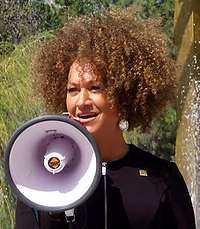Transracial (identity)
Transracial people are individuals who assert a racial identity for themselves which differs from their birth race.[1][2]

Examples
By far the most well-known example of a self-identified person in the English-speaking world is Rachel Dolezal, a woman of white ancestry who identifies as black.[1][2] She successfully passed as black, to the extent that she took over leadership of the Spokane branch of the NAACP in 2014, a year before her "outing" in 2015.
Martina Big, who was featured on Maury in September 2017, is another woman of white ancestry who identifies as black.[3][4] Big has had tanning injections administered by a physician to darken her skin and hair. [3][4]
Ja Du, a trans woman who was born Caucasian but now considers herself Filipina, created a Facebook page and community for others who self-identify as transracial.[5][6][7]
Theoretical approaches
In April 2017, the feminist philosophy journal Hypatia published an academic paper in support of recognizing transracialism and drawing parallels between transracial and transgender identity.[1] Publication of this paper resulted in considerable controversy. The subject was also explored in Trans: Gender and Race in an Age of Unsettled Identities, a 2016 book by UCLA sociology professor Rogers Brubaker, who argues that the phenomenon, though offensive to many, is psychologically real to many people, and has many examples throughout history.[8][9]
Controversy over the term
Historically, transracial has been used to describe parents who adopt a child of a different race.[10][11][12]
The use of the term to describe changing racial identity has been criticized by members of the transracial adoption community. Kevin H. Vollmers, executive director of an adoption non-profit, said the term is being "appropriated and co-opted" and that this is a "slap in the face" to transracial adoptees.[12] In June 2015, about two dozen transracial adoptees, transracial parents and academics published an open letter in which they condemned the new usage as "erroneous, ahistorical, and dangerous."[12][13][14]
See also
- Ethnic plastic surgery
- Good hair
- Otherkin
- Passing (racial identity)
- Transabled (body integrity dysphoria)
- Transhumanism
References
- Tuvel, Rebecca (2017). "In Defense of Transracialism". Hypatia. 32 (2): 263–278. doi:10.1111/hypa.12327. ISSN 0887-5367.
- Brubaker, Rogers (2015). "The Dolezal affair: race, gender, and the micropolitics of identity". Ethnic and Racial Studies. 39 (3): 414–448. doi:10.1080/01419870.2015.1084430. ISSN 0141-9870.
- Lubin, Rhian (September 22, 2017). "White glamour model with size 32S breasts who spent £50k on cosmetic surgery now 'identifies as a black woman'". Daily Mirror. Retrieved October 1, 2017.
- Valens, Ana (September 22, 2017). "White woman who 'transitioned' races to Black is back". The Daily Dot. Retrieved October 1, 2017.
- Yam, Kimberly (2017-11-15). "Filipinos Aren't Happy With This White Woman Claiming To Be Filipina". HuffPost. Retrieved 2020-01-22.
- "Man born white explains why he now identifies as Filipino". The Independent. 2017-11-14. Retrieved 2018-12-30.
- Salo, Jackie (2017-11-13). "'Transracial' man was born white, identifies as Filipino". New York Post. Retrieved 2018-12-30.
- "Trans: Gender and Race in an Age of Unsettled Identities". Princeton University Press. Retrieved March 13, 2018.
- Brubaker, Rogers (2016). "Introduction" (PDF). Trans: Gender and Race in an Age of Unsettled Identities. Princeton, N.J.: Princeton University Press. pp. 1–11. ISBN 9780691172354. Retrieved March 13, 2018.
- Valby, Karen. "The Realities of Raising a Kid of a Different Race". Time. Retrieved December 17, 2017.
- NPR Staff (January 26, 2014). "Growing Up 'White,' Transracial Adoptee Learned To Be Black". NPR. Retrieved December 17, 2017.
- Kai-Hwa Wang, Frances (June 17, 2015). "Adoptees to Rachel Dolezal: You're Not Transracial". NBC News. Retrieved December 17, 2017.
- Moyer, Justin Wm. (June 17, 2015). "Rachel Dolezal draws ire of transracial adoptees". Washington Post. Retrieved December 17, 2017.
- Kimberly McKee, PhD; et al. (June 16, 2015). "An Open Letter: Why Co-opting "Transracial" in the Case of Rachel Dolezal is Problematic". Retrieved December 17, 2017.
Further reading
- Brubaker, Rogers (2016). Trans: Gender and Race in an Age of Unsettled Identities. Princeton, N.J.: Princeton University Press. ISBN 978-0-691-17235-4.
- Dolezal, Rachel (2017). In Full Color: Finding My Place in a Black and White World. with Storms Reback. Dallas: BenBella Books. ISBN 978-1-944648-17-6.